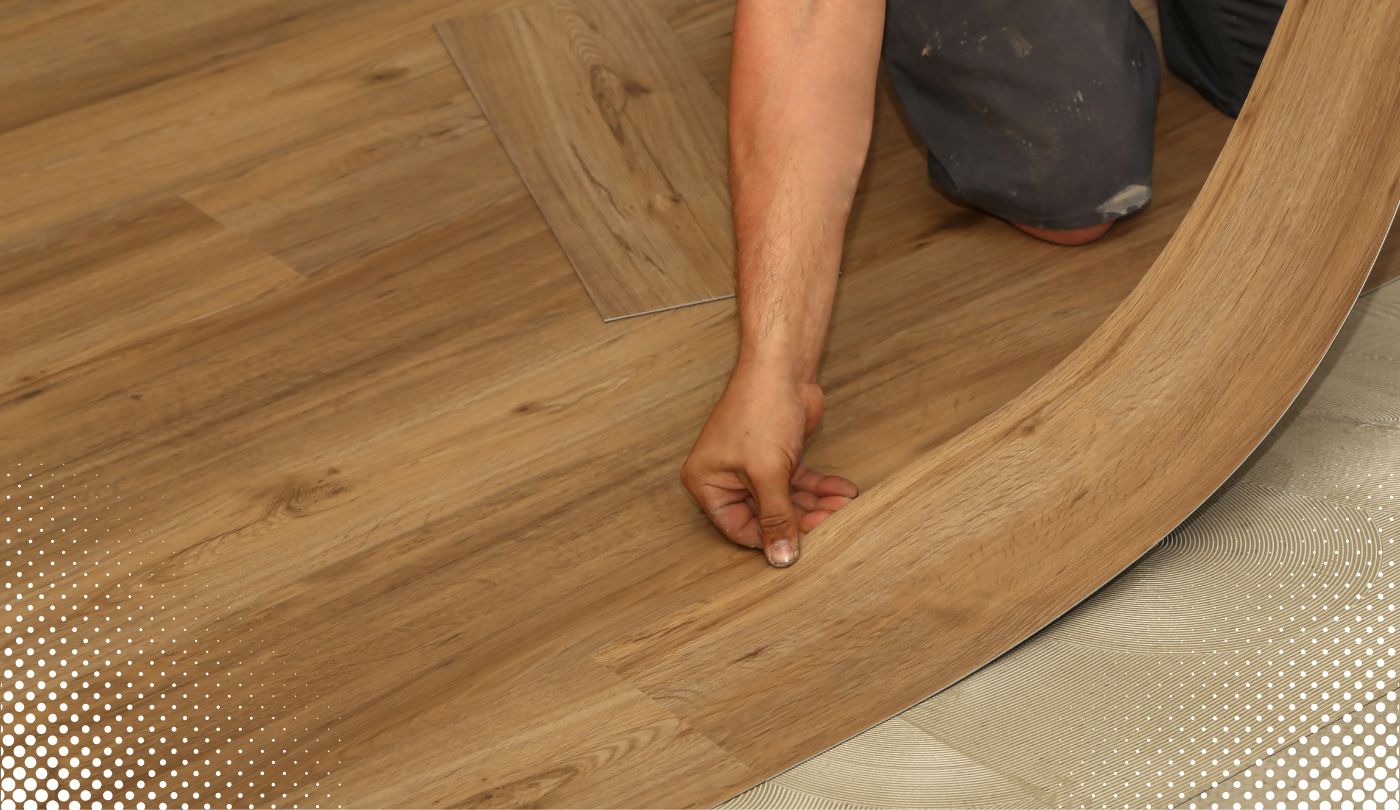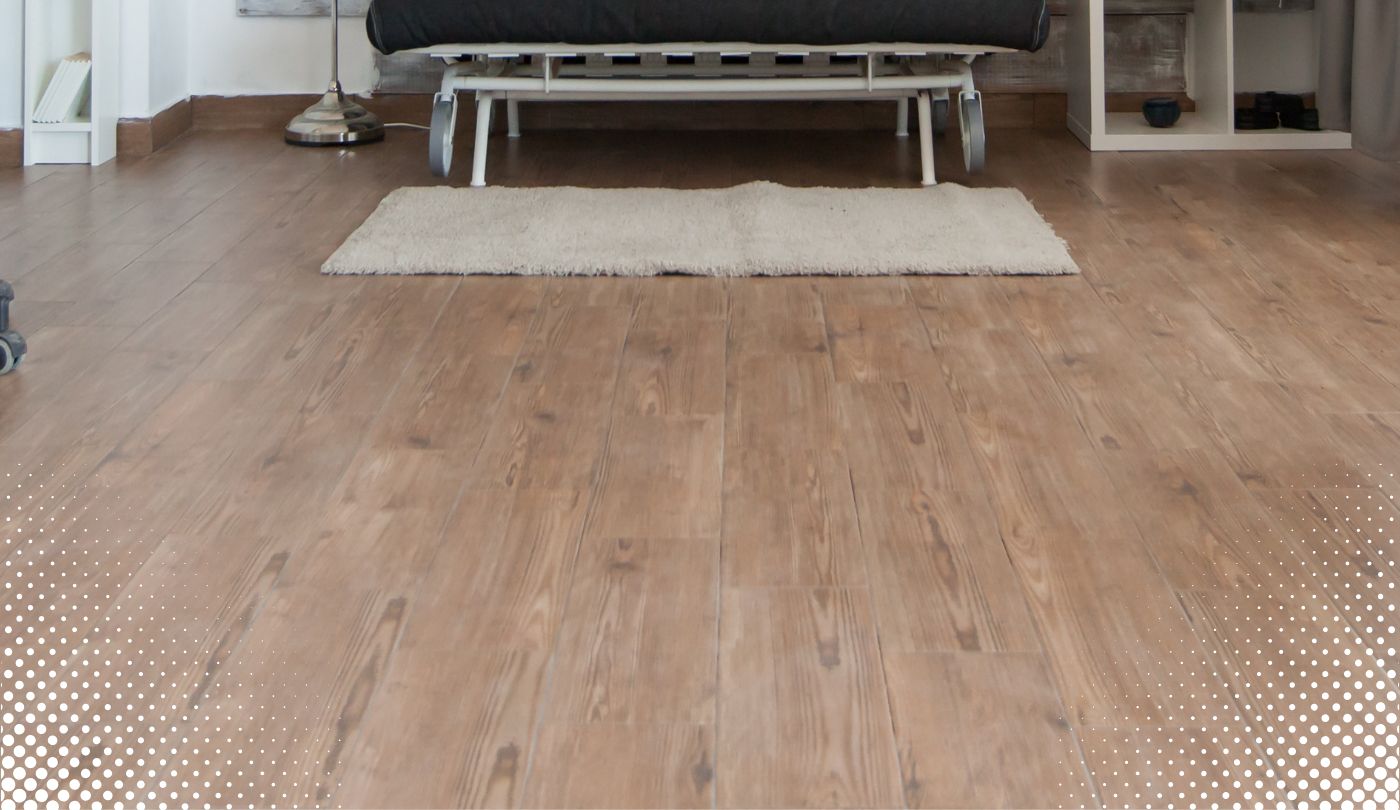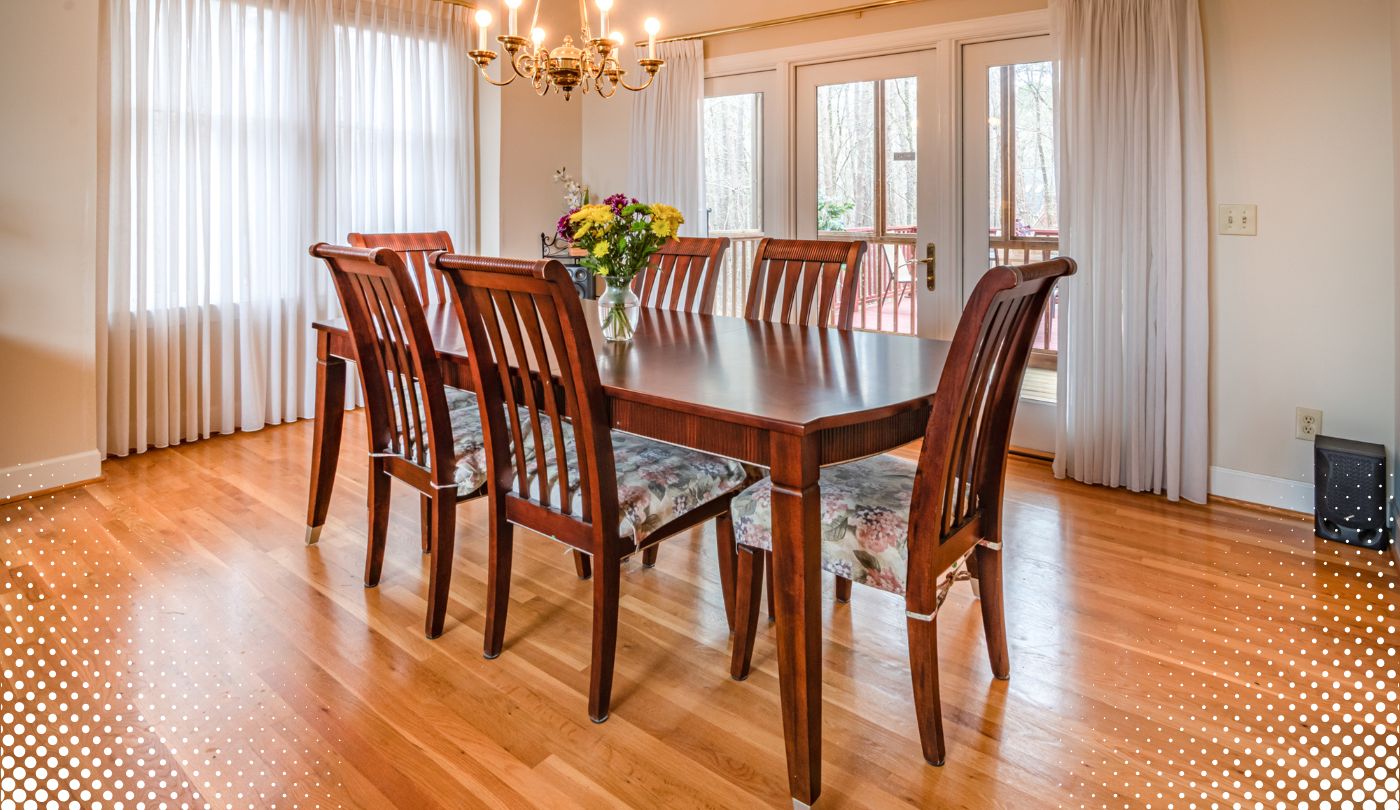Should you choose LVP (Luxury Vinyl Plank) or hardwood flooring? This blog compares their costs, durability, aesthetics, and maintenance in the context of LVP vs hardwood to help you make the right decision.
Key Takeaways
- LVP offers an affordable, durable, and easy-to-install flooring option that mimics the look of hardwood, making it a popular choice for various spaces, including moisture-prone areas.
- Hardwood flooring provides timeless beauty and lasting value, with options like solid and engineered varieties that can be refinished and enhance resale potential, though it tends to be more expensive and requires more maintenance.
- Choosing between LVP and hardwood depends on personal preference, lifestyle needs, and budget; LVP is great for low-maintenance environments, while hardwood appeals to those valuing natural aesthetics and long-term investment.
Understanding Luxury Vinyl Plank (LVP) Flooring
Luxury vinyl plank (LVP) flooring has garnered a surge in popularity among homeowners due to its exceptional ability to imitate the aesthetic of genuine wood while also providing practical advantages. Constructed mainly from polyvinyl chloride (PVC), this synthetic flooring choice is engineered to simulate the look of hardwood and stone, presenting an expansive selection of design possibilities suitable for any residential setting. As a durable and stylish option, luxury vinyl offers consumers the elegant appearance that comes with high-quality vinyl planks.
The cost-effectiveness of LVP flooring stands out as one of its primary attractions. In contrast to traditional hardwood floors, luxury vinyl plank provides a financially accessible alternative catering to diverse budgets. The simplicity behind its installation process. Adds appeal to those who enjoy do-it-yourself projects, allowing it to be utilized across various spaces including areas prone to moisture such as kitchens and bathrooms.
Advanced manufacturing techniques have enabled LVP’s designs to achieve impressive levels of realism with textured surfaces that bear resemblance authentic wood textures. With attributes like hand-scraped finishes coupled with planks available in varying dimensions—commonly ranging between 6 inches wide by 36 inches long up through wider options at 9 inches by lengths up to 60 inches—luxury vinyl plank aligns seamlessly within contemporary or classic interior settings alike.
Exploring Hardwood Flooring
Hardwood floors are cherished for their enduring beauty, capturing the hearts of many homeowners. When it comes to hardwood flooring, there are two main varieties: solid hardwood and engineered hardwood. Solid wood flooring is made from a single piece of timber, offering robustness and an ageless aesthetic that can withstand decades.
Conversely, engineered hardwood floors feature multiple layers with a real hardwood top layer. This multilayer structure increases stability and reduces susceptibility to deformation due to changes in moisture levels. The surface layer on engineered woods gives them the same visual appeal as solid woods while enhancing durability in places with heavy footfall. Engineered wood flooring has become a favored option among those who value both attractiveness and practicality since they offer adaptability across different style choices.
The inherent allure of wood flooring lies in its unique ability to exhibit distinctive grain patterns and color variations within each board, adding singular character to any space. As time passes, these planks gain a deeper patina that amplifies their allure—each species like oak or maple contributes varying degrees of hardness along with individualized textures.
Comparing Aesthetics: LVP vs. Hardwood
Hardwood flooring is renowned for its warm tones and distinct grain patterns, which grow more appealing with age. As time passes, natural wood develops a unique patina, enhancing the elegance and charm of any space. Its authentic texture and subtle color variations make hardwood a timeless choice for those who appreciate natural beauty.
In contrast, luxury vinyl plank (LVP) flooring has advanced in replicating the look of real wood through high-definition printing, offering impressive texture and color accuracy. While it may not fully capture the genuine feel of hardwood, many top-tier LVP options provide a visually appealing and diverse range of styles. Choosing between the two depends on whether you value the evolving character of natural wood or the durable, stylish imitation that LVP offers.
Durability and Longevity
Luxury vinyl plank typically surpasses hardwood in areas subject to high volumes of activity due to its enhanced resilience against scratches, indents, and moisture-related harm. However, professionally installed hardwood flooring offers a different kind of longevity—one that can last for generations with proper maintenance. Hardwood floors can be refinished multiple times, restoring their original beauty, while LVP, once damaged, often requires replacement.
Moreover, professionally installed hardwood ensures a precise fit, reducing gaps and movement over time, whereas poorly installed vinyl planks may shift, causing uneven surfaces. A professional installation also includes expert sealing and finishing techniques that further protect hardwood from wear and tear, making it a reliable choice for homeowners seeking a lasting investment.
Cost Analysis: LVP vs. Hardwood
While luxury vinyl plank is often marketed as a cost-effective flooring solution, it’s essential to consider long-term expenses. The initial cost of LVP may be lower than hardwood, but its limited lifespan means it will likely need replacement sooner. On the other hand, professionally installed hardwood is a long-term investment. With expert installation and periodic refinishing, hardwood can maintain its beauty and durability for generations, making it a more cost-effective choice over time.
Additionally, the value hardwood flooring adds to a home is significantly higher than LVP. Many real estate professionals agree that hardwood floors increase resale value, making them a sought-after feature for potential buyers. Investing in professional installation ensures a flawless finish, further enhancing the aesthetic appeal and value of the property.
Moisture Resistance and Water Tolerance
Moisture resistance is vital, especially for kitchens and bathrooms. LVP is designed to thrive in high-moisture environments, making it an ideal choice for such spaces. Unlike hardwood, LVP does not expand or warp when wet, offering a significant advantage in moisture-prone areas.
Hardwood flooring, on the other hand, is vulnerable to moisture damage, which can lead to significant structural issues over time. Solid hardwood is especially prone to warping and expanding when exposed to moisture. However, engineered hardwood offers better moisture resistance due to its layered construction, which provides enhanced stability. Some manufacturers even offer waterproof engineered hardwood options.
In terms of maintenance, LVP requires less attention to moisture control compared to hardwood. Its water-resistant properties make it a low-maintenance option for high-humidity areas, ensuring that it remains a popular choice for many homeowners.
Maintenance and Cleaning
Maintaining luxury vinyl plank flooring is relatively simple—regular sweeping and occasional damp mopping are usually sufficient. Hardwood, on the other hand, requires a more specialized approach to maintain its integrity over the years. Professional hardwood maintenance services include deep cleaning, recoating, and refinishing to keep the flooring in top condition.
Unlike LVP, which cannot be repaired once worn out, hardwood flooring can be professionally restored through refinishing, a process that removes surface scratches and restores its original appearance. Expert refinishing services help extend the life of hardwood floors, ensuring they remain a valuable feature in any home for decades.
Installation Process
Choosing between LVP and hardwood flooring largely depends on the installation process. DIY enthusiasts are often attracted to LVP floors due to their easy setup, featuring a click system that allows for quick assembly without needing adhesives or nails. LVP can be installed directly over existing floors, reducing both preparation time and associated costs.
On the other hand, installing solid hardwood requires more precision and typically necessitates professional expertise due to its common reliance on glue or nail-down methods. This makes it more challenging and labor-intensive compared to installing engineered hardwood, which offers a variety of installation methods such as floating, gluing, nailing, or stapling. Regardless of whether you choose solid or engineered hardwood, it’s advisable to acclimate the materials to indoor conditions before installation to ensure they adjust optimally.
For those who prefer not to undertake DIY installations of LVPs, primarily because they seek the polished look that only professional handling of natural wood can deliver, hiring experienced installers is a common choice. Despite the potentially higher costs, this precise craftsmanship enhances both the longevity and aesthetic appeal of professionally installed real wood surfaces.
Environmental Impact
Luxury vinyl plank flooring is typically manufactured using synthetic materials, making it less environmentally friendly than natural hardwood. However, hardwood flooring sourced from responsibly managed forests offers a more sustainable option. Many professional flooring providers prioritize eco-friendly practices, using wood from certified sustainable sources and employing low-VOC finishes to reduce indoor air pollution.
Proper installation by professionals also enhances the sustainability of hardwood floors. Precision installation minimizes waste, ensuring that materials are used efficiently. Additionally, hardwood’s longevity reduces the need for replacement, making it a more sustainable long-term choice compared to synthetic flooring options.
Comfort and Acoustics
When choosing flooring for your home, it’s important to take into account comfort and sound. Luxury Vinyl Plank (LVP) flooring provides a softer, more welcoming touch than hardwood floors due to its resilient core which better absorbs sound. This makes LVP an attractive option for areas that receive a lot of foot traffic where both coziness and noise dampening are essential.
In contrast, hardwood flooring can be less inviting in terms of temperature and tactile sensation, especially when the weather is cold. Hardwood doesn’t offer the same level of acoustic buffering as LVP does. Many homeowners still prefer wood floors because they exude a natural warmth with their timeless aesthetic charm, despite being somewhat harder underfoot.
Resale Value and Market Perception
When contemplating the addition of new flooring, homeowners must weigh factors such as resale value and how it may affect market perception. Hardwood floors are often seen as a premium feature that can boost the resale prospects of a home. Due to their timeless charm and long-lasting nature, hardwood floors are favored by many buyers and can contribute positively to both the market appeal of a home and its potential for an increased resale value.
Luxury vinyl plank (LVP) flooring might not carry the same level of prestige associated with hardwood, but is gaining traction in ways that could also benefit resale values. High-grade luxury vinyl plank offers an attractive proposition for those in search of flooring options that combine ease-of-care with durability. As such, this modern favorite among homeowners serves as a practical choice while providing aesthetic appeal.
Choosing to invest in hardwood flooring over alternatives like luxury vinyl could lead to greater enhancement in property value, thereby presenting itself as an investment worth considering by those aiming to elevate their home’s appeal on the market. Nevertheless, luxury vinyl remains appealing due to its affordability and low maintenance requirements, positioning it as a strong contender for cost-conscious homeowners who do not want compromise on style or functionality.
Choosing the Right Flooring for Your Home
When choosing the right flooring for your residence, it’s vital to take into account your lifestyle and financial plan. Reflect on what you prefer personally, how much traffic your home experiences regularly, as well as whether children or pets are part of the equation. If you’re dealing with high moisture levels or considerable footfall in certain areas, solid hardwood may not be ideal. Meanwhile, LVP can serve as a more resilient and adaptable solution across different settings.
Fiscal considerations play a critical role when selecting flooring options. The preferences of homeowners also have a substantial impact on these choices. For those looking for an affordable option that requires minimal upkeep, LVP stands out as an exceptional choice. If you’re drawn to the enduring charm and potential added resale value that genuine hardwood provides, committing to solid or engineered hardwood flooring could prove to be the superior investment strategy.
Summary
When deciding between luxury vinyl plank and hardwood flooring, it’s essential to weigh factors such as long-term value, durability, and professional expertise. Hardwood floors, like those offered by Oshkosh Designs, provide an enduring beauty that can be refinished and maintained for generations, unlike LVP, which may require more frequent replacement. Opting for hardwood ensures a classic aesthetic and enhances your home’s value through a seamless, professional installation that stands the test of time.
At Oshkosh Designs, hardwood floor inlays are our specialty, offering high-quality flooring solutions that combine elegance, longevity, and sustainability. Our expertly crafted inlays add a unique touch to any space, ensuring your floors are both functional and visually stunning. Whether you’re seeking to elevate your home’s interior or invest in lasting quality, our team is dedicated to delivering exceptional craftsmanship. Intrigued by the possibilities? Contact us today to transform your flooring vision into reality.
Frequently Asked Questions
How can I determine if my current system is outdated?
If your system struggles with efficiency, requires frequent repairs, or lacks modern security features, it may be time for an upgrade.
What factors should I consider when choosing a new system?
Look for scalability, integration with existing infrastructure, security capabilities, and long-term cost-effectiveness.
How often should a system be assessed for updates?
Regular evaluations, at least annually, help ensure optimal performance and security while identifying necessary upgrades.




